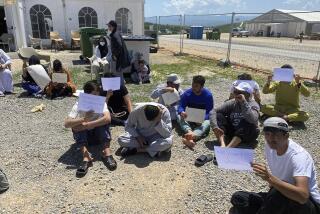Refugees Remember for Clinton
- Share via
STANKOVAC, Macedonia — President Clinton came face to face Tuesday with the grief of Kosovo.
With a 2-year-old ethnic Albanian boy on his lap and mud on his boots, the president of the United States sat on a cot under green canvas in the refugee camp here in northern Macedonia and heard stories of pain and terror.
He heard about the village where Idriz Macastena, a 29-year-old carpenter, and his family had taken refuge, a village where they said 60 people were massacred by Serbs.
He heard about the time a Serbian soldier took Macastena’s almond-eyed 4-year-old son, Besart, put a knife to one side of his neck and a lighted cigarette to the other and, according to one family member, demanded “all our money.”
With the business suit and polished shoes he wore during the day’s diplomatic meetings replaced by khakis, a green sport shirt and work boots, Clinton told the refugees: “It is the American people who care about you, who believe in you, who want you to be free, who want you to be able to go home.”
But he cautioned them not to rush back into Kosovo--as more than 170,000 have--because “you know there are still a lot of land mines in the ground.”
“I don’t want anyone else to lose an arm or a leg or a child because of a land mine,” he added. “Give us a couple of more weeks . . . because you are going to be able to go back in safety and security.”
The roughly 2 1/2 hours Clinton spent in the camp completed a trip that began a week ago with summit-level conferences in Paris and Cologne, Germany, on the need to build a prosperous multiethnic community in the Balkans.
In meetings earlier in the day, the presidents of Macedonia and neighboring Albania, Kiro Gligorov and Rexhep Mejdani, told Clinton that they understood that “their fates were intertwined and they had to work together” to build a “spirit of tolerance,” according to a senior U.S. official.
Clinton delivered such a message himself at earlier stops.
But he made no plea for a multiethnic society before the Kosovo Albanians, who are returning to communities they once shared with the Serbian minority that drove them out.
White House Press Secretary Joe Lockhart said Clinton “gave the message he thought was appropriate” for the hundreds of refugees gathered at the edge of this tent city.
Asked later whether he thought Serbs and Albanians could get along in Kosovo, Clinton replied, “I just don’t know.”
But he said he had expected that the problem of retaliation by returning ethnic Albanians would be worse than it has been.
The camp the president visited with First Lady Hillary Rodham Clinton and their daughter, Chelsea, is equidistant to Skopje, the Macedonian capital, and the border with Kosovo, the southernmost province of Serbia, the main republic in Yugoslavia. It is the largest camp in Macedonia, and it still accommodates an estimated 10,000 Kosovo refugees. Its tents roll out from the valley like subdivisions covering the hillsides of Orange County.
As the president’s Chevrolet Suburban drove through an opening in a roll of barbed wire, it passed seven children, each wearing a piece of white paper taped to clothing and bearing a letter of his last name. On one tent, someone had written in the faint letters of a ballpoint pen: “Welcom Clinton.” In another, postcards bearing his portrait and that of the first lady were hung with paper clips.
The president walked between rows of tents, at one point followed by a string of nearly a dozen young boys. Some held his hands, others clung to his waist. Girls and boys clambered out of tents to join him, and, time after time, he hoisted them into his arms.
Nearly every sentence of the president’s five-minute speech to the refugees, translated into Albanian, was greeted by applause and shouts of his name, which came out “Cleeen-ton!”
“This is the human face of what we’ve been fighting for for the last three months,” said Samuel R. “Sandy” Berger, the president’s national security advisor and an architect of the allied campaign that drove Yugoslav President Slobodan Milosevic into retreat after 11 weeks of NATO bombardment. “To see these people, what they’ve been through, and the fact that they are going to be going home in just a few weeks, was a very moving experience.”
Before the Clintons visited the camp, the first lady outlined a plan to boost the Macedonian apparel industry and at the same time clothe thousands of refugees.
When Hillary Clinton visited Skopje five weeks ago, Danica Georgieva, the owner of a small textile company, told her that the firm was struggling after U.S. apparel giant Liz Claiborne Inc. cut back orders because the war had led to manufacturing delays.
Liz Claiborne has since promised, in a program the first lady presented Tuesday, to contract with Macedonian manufacturers by ordering less time-sensitive clothing, and offered to donate enough fabric and patterns to make 250,000 pieces of clothing to be sewn by 3,000 Macedonian textile workers for refugees.
*
Times staff writer Julie Tamaki in Skopje contributed to this report.
More to Read
Sign up for Essential California
The most important California stories and recommendations in your inbox every morning.
You may occasionally receive promotional content from the Los Angeles Times.













